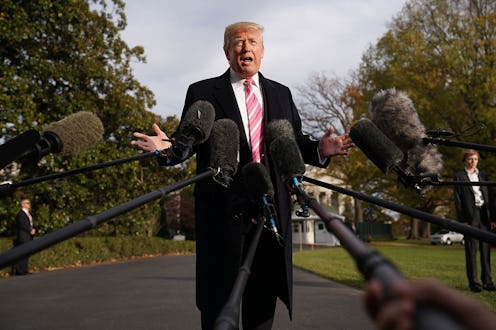News
The White House Is Reportedly Super Annoyed With This Trump Interview

Between rounds of golf and daily tweet-storms, it’s been a busy week for President Trump at his “Winter White House,” aka Mar-a-Lago. He did, however, fit some time in to talk with New York Times reporter Michael Schmidt, and reportedly declined to clear it with with any of his aides. The result was an unhinged New York Times interview from Trump, and White House officials are reportedly none too pleased about it.
In the interview, which took place on Thursday at his golf club in West Palm Beach, Trump spoke at length about the ongoing investigation into whether his administration colluded with Russia during the 2017 presidential election, insisting 16 times that there had been “no collusion.” He also claimed that he had “the absolute right” to do what he wanted with the Justice Department, an agency that is traditionally supposed to operate without the opinion or influence of the president.
The interview immediately drew reactions on social media — some were alarmed, while others were unsurprised. NBC analyst Anand Giridharas called the president's comments about the Justice Department "terrifying," while White House reporter Ali Vitali noted that the interview provided important insight into how Trump views his role in the modern news media. At one point, the president presumed that he would win the presidency again because outlets rely on him for ratings.
Some expressed concern about the way in which the interview was conducted. The transcript revealed that while the president made a number of false or dubious claims throughout the 30-minute interview — as many as 24, according to The Washington Post — Trump was relatively unchallenged by Schmidt, who let him ramble freely.
FiveThirtyEight editor Nate Silver tweeted that he wished Schmidt had asked follow-up questions, while the New York Times' Maggie Haberman fiercely defended her colleague's reporting.
In a follow-up article, Schmidt responded to the criticism, saying, "I believed it was more important to continue to allow the president to speak and let people make their own judgments about his statements."
But beyond questions about the reporting methods used by Schmidt and the revelations raised by the interview, readers were asking something else: what were Trump's aides doing when he agreed to speak with the Times? It's not entirely clear — but it seems they were nowhere near their boss.
An article published on Friday by the Washington Post provided more information about the way in which Trump's aides were reportedly taken aback by his interview with Schmidt. According to the Post, Trump was introduced to Schmidt by Christopher Ruddy, a member of the Trump International Golf Club in West Palm Beach and a confidant of the president's. While communications director Hope Hicks did check in on the president when word got to the White House, some officials weren't even aware of the interview until it was posted online.
The setting of Mar-a-Lago presents a unique challenge for Trump's staff. In Washington, they have some semblance of control over the information that passes before Trump's eyes — they even give him a folder of positive news each day to try to quell his temper, according to White House sources. But at Mar-a-Lago, he's freer to tweet, and subject to the influence of club members trying to affect policy in some way. Politico journalist Isaac Dovere tweeted that the report about Mar-a-Lago captures how "the president’s aides infantalize him by trying to control and contain what he sees and does."
There's another reason why Mar-a-Lago is troubling for the president's public image: his trips there cost taxpayers money. Back in July, a report indicated that the cost of guarding Trump's resort while he stayed there had amounted to more than $6.6 million since January. As NBC journalist Kyle Griffin noted, today will be Trump's 115th day at one of his properties as president.
It's hard to remember a president in recent history who reportedly required so much maintenance on the part of his aides. But Trump is unique to say the least, and his actions at Mar-a-Lago are just one factor that affects the way he is perceived by the public.